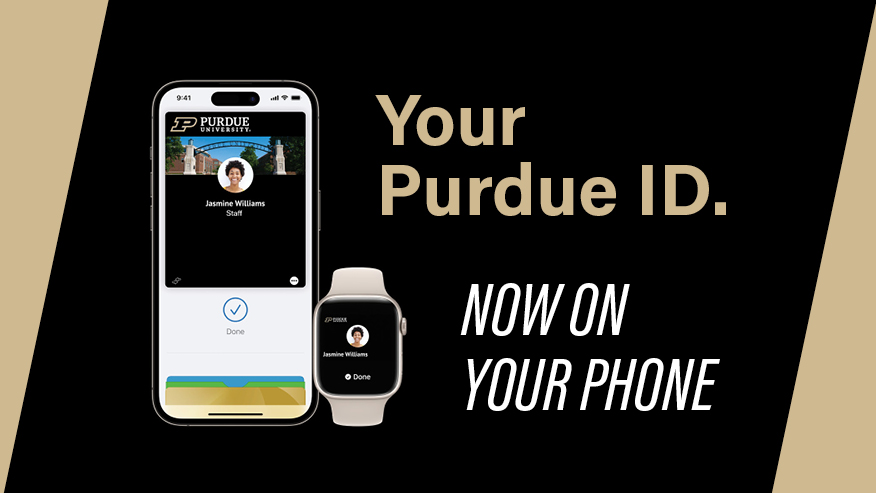Faculty, staff and visiting scholars to be offered optional Purdue Mobile ID credentials as effort extends across West Lafayette campus

Faculty, staff and visiting scholars in West Lafayette can now download Purdue Mobile ID, giving them the option to use mobile credentials on their smartphone instead of a hard-copy ID card. (Purdue University image)
Current Purdue University faculty, staff and visiting scholars in West Lafayette are invited to download their Purdue Mobile ID, allowing them to use mobile credentials on their phone in addition to, or instead of, their physical identification card.
Visit Purdue ID Card Operations/Support for instructions on how to download the Transact eAccount App on a mobile device and add the Purdue Mobile ID to your smartphone’s mobile wallet. Users can add their ID to Apple, Google or Samsung Wallet for using their iPhone, Apple Watch or Android devices.
Since Purdue’s mobile credentials effort was launched in 2023, over 45,000 West Lafayette, Indianapolis and Polytechnic students have transitioned to a digital form of the university’s official ID on their smartphones or smartwatches for accessing buildings, using services and making purchases on their campuses. This initiative follows the successful rollout of mobile credentials, which are now required for all new undergraduate students.
“With the smooth and popular rollout of mobile credentials for our students this past year, we are excited to invite our faculty and staff on the West Lafayette campus the option to join this technological wave,” said Loribeth Hettinger, senior associate bursar of Purdue ID Card Operations/Support.
For employees and visiting scholars who prefer the convenience of using their smartphone to access buildings and services, Hettinger said, Purdue Mobile ID offers a streamlined, secure and easy-to-use alternative to traditional ID cards. Those who want to continue using their physical ID card, however, are welcome to do so, she added. Both options are fully supported, allowing Purdue employees to choose the method that works best for them.
“We understand that each of you have different preferences when it comes to how you access and interact with our systems and facilities. That’s why we’ve made the Purdue Mobile ID an optional feature for employees and visiting scholars,” Hettinger said.
ADDITIONAL INFORMATION
Faculty, staff embrace soft launch
A select group of faculty and staff have piloted adoption of Purdue Mobile ID the past year, and faculty members were invited to download it in late July. Now, over 1,000 faculty and staff are using mobile credentials.
Hettinger said the Purdue ID Card Operations/Support office received a 95% satisfaction rate from those surveyed about their move to mobile ID during the pilot project. Many cited its easy setup and convenience for accessing areas around campus. Some survey responses:
- “I love that you can add your ID to your Apple Watch. It’s so easy to be able to ‘bump’ my watch to the card reader, and being let right in.”
- “So far, everything has been going great when using it — so much easier and more convenient to use.”
- “The main reason I went to mobile ID was because I didn’t have to have my physical ID out all the time when in the office. I also was afraid of losing my physical ID.”
Flexibility of mobile option
Tim Riley, university bursar and assistant controller for Purdue, said the decision to make mobile credentials optional for staff but required, or “Mobile First,” for students comes from understanding the different needs and workflows of each group. This approach also allows Purdue to modernize its credentials system for those who benefit most from it while offering flexibility to employees and visiting scholars who may prefer their hard-copy ID.
“Our Purdue students rely more heavily on smartphones for daily tasks, from scheduling to communications and campus navigation,” Riley said. “By adopting the Mobile First approach for our students, whether they are online or in-person, we are equitable meeting their expectations since they are more accustomed to using mobile technology because of their lifestyle, enhancing convenience and usability.”
Riley said some Purdue staff may have established workflows where physical IDs fit better, particularly for administrative or technical roles where mobile use may not always be convenient. Meanwhile, other staff roles may not require the same level of mobility that students need, making the use of physical IDs equally functional.
The Mobile First strategy, launched last year as part of Purdue’s new mobile credentials system, called for all new students beginning in summer and fall 2023 to have a mobile ID on their smartphones and smartwatches. Riley said the goal is to eliminate the need for hard-copy ID cards for all 50,000 West Lafayette students over the next few years.
Physical ID cards, meantime, are still being provided as an alternative to undergraduate students who do not have a smartphone or if theirs is not compatible with Purdue’s new mobile credentials system.
“With students constantly on the move, mobile credentials streamline access to buildings, services and events, creating a more efficient campus experience. Further, this continues our effort for ‘future-proofing’ our campus, setting up a long-term digital infrastructure for incoming generations,” Riley said.
Among the Big Ten’s early adopters of mobile credentials, Purdue has been laying the groundwork to launch Transact Mobile Credentials since 2013, first by updating campus infrastructure for door readers and point-of-sale devices to be mobile-ready. Purdue is phasing in contactless and tap-to-pay technology using the Transact system across campus.
Purdue Mobile ID was led by Purdue’s ID Card Operations/Support, in partnership with Student Life and Purdue Information Technology. The new Purdue Mobile ID for students is enabled for smartphones via Transact Mobile Credentials.



